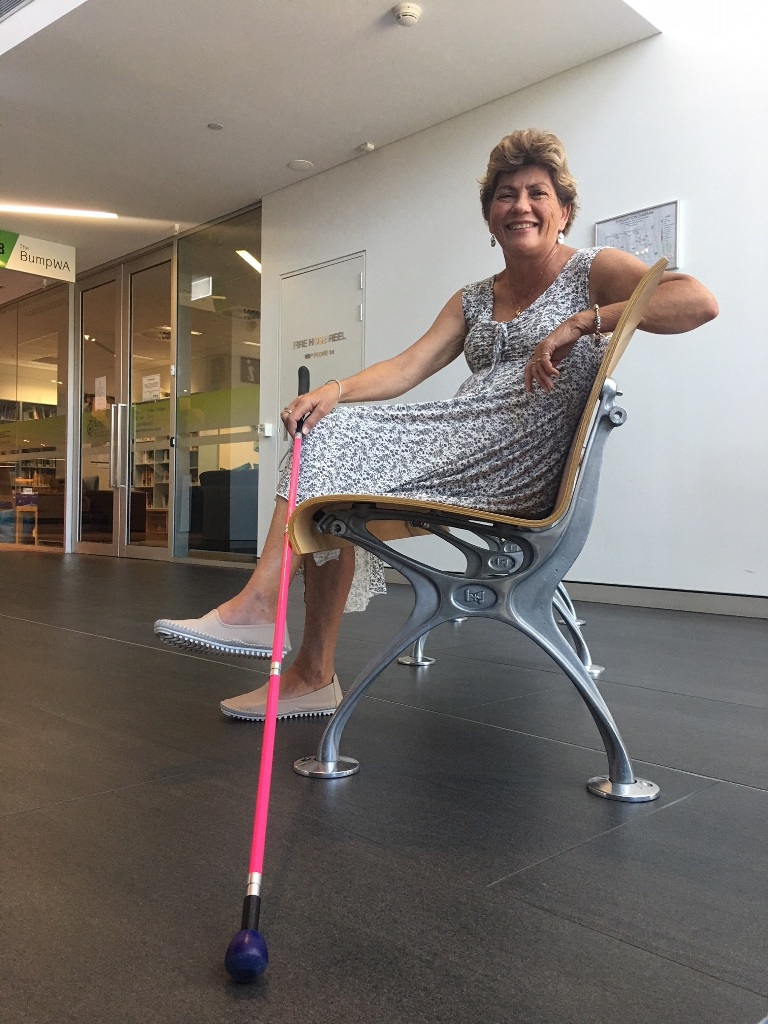Little more than a year ago, Colleen Ashby was clinging to life, with 14 machines keeping her alive following a heart transplant that robbed her of almost all of her vision.
Today, she's weighing up all the opportunities that life with a new heart and low vision has presented as she trains for the Australian Transplant Games later this year.
Colleen, 53, a former fitness instructor who has type I diabetes, was fit and healthy until signs of heart disease – a major complication of diabetes - developed in her 40s.
Last January, Colleen underwent a heart transplant at Perth's Fiona Stanley Hospital.
"It didn't quite go to plan. I spent four days on life support because the new heart wouldn't start up," she says.
"The family was called in three times and told I wasn't going to make it.
"I woke up on day five. They asked, 'How are you?'. I said, 'Good, but I can't see'. It had never happened before."
Colleen suffered ischemic optic neuropathy, a condition in which blood loss permanently damages the optic nerves that send signals from the eyes to the brain, enabling sight.
She has 5% peripheral vision in her right eye and no useable vision in her left eye, but Colleen says she took the devastating news on the chin.
"Honestly, I take things as they come. I've always played the cards that are dealt to me, so when I woke up and I said I had no vision, they said I'd been asleep for almost a week and my brain might take a bit of time to adjust," she says.
"So, as the days went on and there wasn't any improvement, it really didn't faze me, and when I started thinking that this might be permanent, I just thought, 'Well if this has happened, it's going to open up new doorways'. I kept thinking that opportunities were going to come out of this."
Colleen is mulling over the prospect of motivational speaking, or extending her work as a special needs education assistant at a high school.
"I think that it's losing my vision is a small price to pay for having a new chance of life with the new heart. Having a new life is the most important thing and vision is secondary, and that hasn't stop me doing anything," Colleen says.
She's also back on top physically.
"I'm going great guns now. I swim 1600 metres three times a week. I'm out walking all around the hills in Lesmerdie, between five and 10 kilometres, and I do my own weight training at home."
Colleen says she's Colleen is now training to compete as a swimmer at the Australian Transplant Games, which begin on 30 September and will feature athletes from 17 nations.
"Swimming is about the only event I can do with low vision. With swimming, I can swim in my lane and I can see enough of the line on the bottom of the pool, so that's my plan," she says.
These days, Colleen gets around using a long cane – but it's not the standard white model.
"I've got to be a trend-setter. When they said I should get a cane, I asked if they come in any other colour but white, so I have hot pink with a purple ball, and everybody comments on my cane," she says.
"It's great in the shopping centre. My son calls it the People Mover because it moves people out of the way."
She sees nothing remarkable about her drive and her optimism.
"I feel like my world has opened up more," she says. 
"People seem to think you're pretty amazing when you're doing things and you can't see, but I think it's just every day and it's no big deal.
"People at work say, 'Oh my God, you're amazing, I don't know how you do it', but I think that you just do it. It's life. What else do you do?"
Vision Australia has supported Colleen since she was in the cardiac care unit a year ago.
Vision Australia's involvement began with small, practical things like ensuring Colleen's mobile phone was more accessible for her.
Apart from her hot pink cane, Vision Australia has given Colleen visual and tactile aids and a range of handy gadgets that keep her active in the kitchen, and has supported Colleen by navigating the NDIS system together.
"Vision Australia is fabulous. They are really supportive. They are always on the phone if you need them, or offering anything new that might be handy," she says.
Vision Australia has also supported Colleen to work towards her goals to be more independent in the home and in the wider community with the use of strategies, education and assistive technology.
Colleen is now a very savvy user of her iPhone with Voiceover and Siri, and is learning use a Macbook with VoiceOver.
She also uses assistive technology like the Galaxy ID Mate barcode scanner and Victor Reader Stream. These devices assist Colleen to access information in audio form.
Colleen has returned to work at a local high school with Vision Australia's support, working jointly with the school and the Department of Education.
She is being assessed for a Seeing Eye Dog.
Colleen Ashby is seeking public assistance to raise money to get her and her family to the Australian Transplant Games via GoFundMe.










